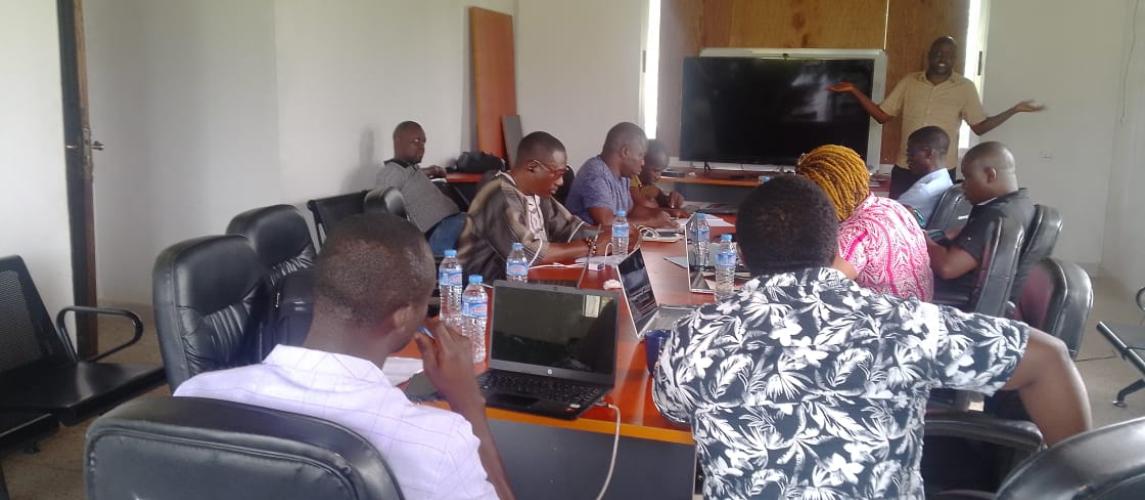
SADFONS Project Strengthens Financial Systems to Accelerate Agricultural Output Toward 250 Tonnes Target At CARI
SUAKOKO, Bong County — In a strategic move to bolster financial accountability and operational efficiency, the Smallholder Agriculture Development for Food and Nutrition Security (SADFONS) Project, implemented by the Ministry of Agriculture and funded by the African Development Bank (AfDB), has conducted a three-day financial management capacity-building workshop at the Central Agricultural Research Institute (CARI).
Held August 27 – 29, 2025, at CARI’s headquarters in Suakoko, the training brought together finance, procurement, and internal audit teams from both the Ministry and CARI to strengthen institutional coordination and compliance under the SADFONS framework. The initiative is part of broader efforts to meet the Project’s ambitious goal of producing 250 tonnes of staple crops, including rice, cassava, and vegetables, across targeted counties.
Led by the Project’s Financial Management Unit, the workshop introduced new templates and tools for budgeting, financial reporting, and procurement planning. Participants engaged in practical sessions that emphasized work planning and budget execution, financial control and reporting procedures, compliance with the Government of Liberia’s fiscal regulations, and alignment with SADFONS Standard Operating Procedures (SOPs). The training also reinforced the importance of fiduciary compliance in ensuring transparency, accountability, and internal control across all project components.
Bob V. Fassah, Project Accountant, opened the session by outlining the legal and financial architecture of the SADFONS Project. He detailed the allocation of funds by component, distinctions between eligible and ineligible expenditures, disbursement modalities, and institutional reporting obligations. “Fiduciary compliance ensures accountability, transparency, and internal control,” Fassah emphasized.
Mohammed Kamara, Procurement Officer for the SADFONS Project, provided a comprehensive overview of procurement processes, including the development of purchase requisitions and specifications, scope of services, vendor selection criteria, and timelines for procurement methods.
He also outlined that the Request for Quotation (RFQ) takes 28 days, National Competitive Bidding (NCB) takes up to 90 days, and International Competitive Bidding (ICB) takes up to 125 days. Kamara stressed the importance of aligning procurement timelines with project deliverables to avoid delays and ensure value for money.
Presenting on key components of audit functions, Joseph Gborie, Internal Auditor at the Project Management Unit of the Ministry of Agriculture, said effective internal auditing is a cornerstone of good governance, transparency, and accountability in public institutions.
Mr. Gborie emphasized that audit functions can be broadly categorized into four interrelated components that collectively strengthen institutional integrity and performance. “Assessment is the systematic evaluation of financial records, operational procedures, and compliance frameworks to determine their accuracy, efficiency, and alignment with organizational goals,” he told his colleagues.
Key, he added, is reviewing financial statements and transactions, evaluating program performance against objectives, identifying gaps, inefficiencies, or irregularities, and providing recommendations for corrective actions. He outlined that the internal control systems are the policies, procedures, and mechanisms designed to safeguard assets, ensure accurate reporting, and promote operational efficiency.
According to him, these include control environment (organizational culture and ethics), risk assessment procedures, control activities (e.g., authorizations, reconciliations), information and communication systems, and monitoring and evaluation mechanisms. “The purpose is to reduce the risk of fraud, error, and mismanagement while enhancing accountability and compliance.”
The Auditor indicated that with adherence to established policies, this component focuses on ensuring that institutional governance structures are functioning effectively and that all operations adhere to established policies, laws, and regulations.
“Risk assessment and management involve identifying, analyzing, and prioritizing potential threats to the organization’s objectives. Risk management refers to the strategies and controls implemented to mitigate those risks, to protect the organization from unforeseen disruptions, and ensure resilience in operations,” he stressed.
Together, these four components form the backbone of a robust audit function. Mr. Gborie’s presentation underscores the importance of integrating assessment, internal control enhancement, governance verification, and risk management into the audit cycle to promote transparency, efficiency, and institutional sustainability.
The SADFONS Project, a flagship agricultural initiative, is designed to improve food and nutrition security, reduce rural poverty, and enhance institutional capacity across six counties: Grand Gedeh, River Gee, Bomi, Maryland, Montserrado, and Grand Bassa.
Funded through the Global Agriculture and Food Security Program (GAFSP), the Project supports the distribution of power tillers, combined harvesters, cassava graters, and gari fryers; construction and rehabilitation of irrigation infrastructure for lowland rice cultivation, and technical and material support to farmers’ cooperatives and producer organizations.
The SADFONS Project is fully aligned with Liberia’s National Agriculture Development Plan, the ARREST Agenda for economic transformation, and Sustainable Development Goal 2: Zero Hunger.
The training marks a critical step in ensuring that financial and procurement systems are robust enough to support the SADFONS Project’s production targets and long-term sustainability. By reinforcing institutional capacity at CARI and across implementing units, the Project is poised to deliver measurable impact in agricultural productivity, market access, and rural livelihoods.
